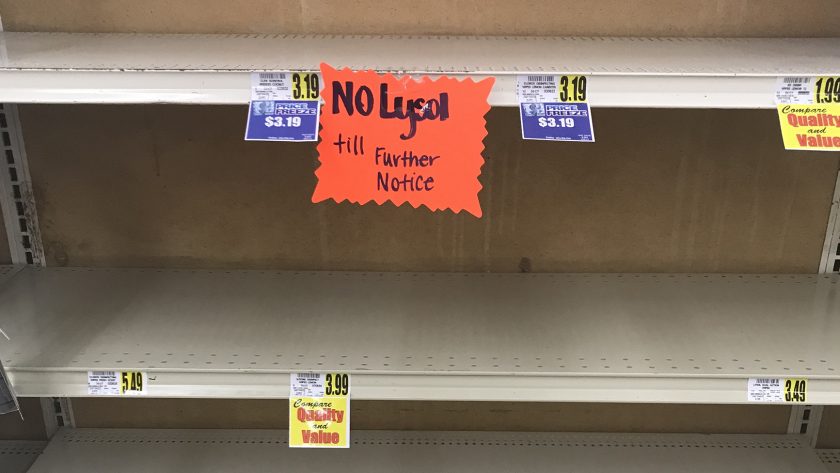What is a number if it’s not correct? Should there even be a number? Is any number better than no number?
Part of my new daily routine, aside from making sure my 4-year-old’s snack times are met, is checking the Georgia Department of Health site at noon and 7 p.m. to see what the updated coronavirus numbers are. At this point, I’m not surprised when they go to triple digits, though I should be. The reality is the numbers are higher, except no one can be sure because the state isn’t testing everyone it should. Part of this is because there are no tests available — you can’t test people with something you don’t have. But numerous first-person accounts are coming out that patients are being told they have coronavirus but aren’t tested for it. In one engaging video account by a man from East Athens, he was told testing him for the virus changes his treatment. So they sent him home. I don’t know the medical implications between what is done for having it or not having it, but isn’t not testing a disservice to the greater good?
By not testing everyone who might have coronavirus, or was in contact with people who might be, the government represents an incorrect number to the public leading some to believe the pandemic is not as bad as it is. The lack of transparency is alarming — if the fear of showing the real numbers will start a panic, THEN START A PANIC. Until everyone realizes the depth of this crisis, we will not escape it in the foreseeable future. We will always be looking over our shoulders.
While I have a Twitter account, I don’t engage in the social medium. It seems like the best thing that can happen is people like your tweet, while the worst thing is 1 billion people want you dead and your reputation is ruined. It’s an untenable balance. But if Twitter is good for anything, it takes an immediate snapshot of the world at this moment, and it shows not enough are taking the pandemic seriously. Plenty of pictures show people packed in parks and beaches, immune to the scolding tweets of others but somehow not immune to a virus they can’t see? The oddest aspect of this virus is you can have it without symptoms — but you will pass it along. Will the next people have the same lack of symptoms? Will their family?
Of the people who do succumb to this deadly virus, the phrase “underlying conditions” is often attached. What exactly does that mean? If you’re someone like me, who has been on the Earth for half a century, you have underlying conditions. I was born with a heart ailment, I have asthma. Are these underlying conditions? Is that the story they will tell if COVID-19 takes me?
Fear is a fickle emotion, it adapts to the world around it. I remember the summer of 2001 when there was a sudden rise in shark attacks. It would turn out the number wasn’t out of the norm, but a few high-profile attacks set people on edge. Swimmers stayed out the water that summer, with each new attack finding the front pages. But on September 11 the fear for shark attacks went away, replaced by a fear everyone shared.
How everyone is not sharing in this new fear boggles the mind, but understandable given we don’t have the right information. I’ve written columns for 30 years and learned they don’t do a bit of good unless they offer a plan for moving forward. So I offer this:
• Demand more tests. We should all be tested. On the Piedmont Athens Regional website it reads: “If you have not traveled to a Level 3 country, do not have knowledge of coming into contact with a diagnosed case of COVID-19 and are not showing symptoms consistent with COVID-19, there is no clinical reason for testing.” Isn’t being in a pandemic a clinical reason? Health officials do not say who was diagnosed (for legal reasons), so how would I know if I came into contact with a diagnosed case? As of Monday, there are 41 “diagnosed” cases in Athens-Clarke County. Does anyone believe that? Where are those 41 cases? Are they in the hospital? At home? Do we know? Find a way to test everyone.
• Demand transparency. How often are hospitals updating their information to the Georgia Department of Health? How many people are hospitals telling to isolate at home, without getting a test? How up-to-date is the GDH with its numbers? The fact that we don’t know these answers shows a lack of transparency.
• Do you want a football season? Then stay at home. At the rate this is going, do you want to be in a stadium full of people in September? Those on the front lines are out and have a job to do, but for those that don’t fall in that category, being out and not social distancing puts them at risk. If we don’t all do this, the virus won’t go away. The countries that stop everything are the ones getting better.
• Don’t blame, and don’t procrastinate. We have to do this together while making sure we are far apart. I know we all have different ideologies, but we should all share in empathy. And understand we have to change how we think now so there’s an ending, even if we can’t see it now.
Stay safe Athens.




